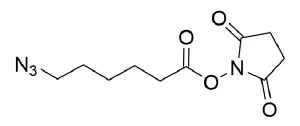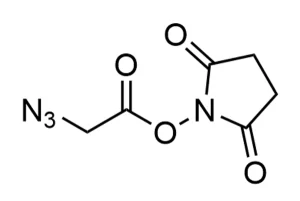Azido-dPEG®12-NHS ester, product number QBD-10505, contains an azide group linked to an N-hydroxysuccinimidyl (NHS) ester through a single molecular weight, discrete polyethylene glycol (dPEG®) spacer. This product works with copper(I)-catalyzed, ruthenium-catalyzed, and with copper-free (e.g., strain-promoted) click chemistry. The dPEG® spacer imparts water solubility and adds hydrodynamic volume to the conjugated product. The single molecular weight product design, with its discrete chain length, simplifies the analysis of this product.
NHS esters are the most popular, most widely used way to conjugate carboxylic acids to primary or secondary amines resulting in stable amide bonds. NHS esters react quickly and efficiently in aqueous media at physiological pH values (7.0 – 7.5). However, they are prone to hydrolysis over time. Moreover, the rate of hydrolysis is pH-dependent. Consequently, they must be used immediately upon dissolution in water or aqueous buffer. Published research has shown that 2,3,5,6-tetrafluorophenyl (TFP) esters are more hydrolytically stable and have better reactivity than NHS esters.
| Unit Size | 100 mg, 1000 mg |
|---|---|
| Molecular Weight | 740.79; single compound |
| Chemical formula | C₃₁H₅₆N₄O₁₆ |
| CAS | 1108750-59-9 |
| Purity | > 98% |
| Spacers | dPEG® Spacer is 40 atoms and 47.2 Å |
| Shipping | Ambient |
| Typical solubility properties (for additional information contact Customer Support) | Methylene chloride, Acetonitrile, DMAC, or DMSO. |
| Storage and handling | -20°C; Always let come to room temperature before opening; be careful to limit exposure to moisture and restore under an inert atmosphere; stock solutions can be prepared with dry solvent and kept for several days (freeze when not in use). dPEG® pegylation compounds are generally hygroscopic and should be treated as such. This will be less noticeable with liquids, but the solids will become tacky and difficult to manipulate, if care is not taken to minimize air exposure. |
Greg T. Hermanson, Bioconjugate Techniques, 3rd Edition, Elsevier, Waltham, MA 02451, 2013, ISBN 978-0-12-382239-0; See Chapter 18, Discrete PEG Reagents, pp. 787-821, for a full overview of the dPEG® products.
Chemoselective Immobilization of Peptides on Abiotic and Cell Surfaces at Controlled Densities. Venkata R. Krishnamurthy, John T. Wilson, Wanxing Cui, XueZheng Song, Yi Lasanajak, Richard D. Cummings, and Elliot L. Chaikof,Langmuir, 2010, 26 (11), pp 7675–7678, May 7, 2010. DOI: 10.1021/la101192v.
Constant-speed vibrational signaling along polyethylene glycol chain up to 60-Å distance. Zhiwei Lin and Igor V. Rubtsov. PNAS, 2012, 5 (109), pp 1413-1418, January 31, 2012. DOI: 10.1073/pnas.1116289109.
Ballistic energy transport along PEG chains: distance dependence of the transport efficiency. Zhiwei Lin , Nan Zhang , Janarthanan Jayawickramarajah and Igor V. Rubtsov. Physical Chemistry Chemical Physics. 2012, 30 (14), pp 10445-10454. April 12, 2012. DOI: 10.1039/C2CP40187H.
Shape-Encoded Chitosan-Polyacrylamide Hybrid Hydrogel Microparticles with Controlled Macroporous Structures via Replica Molding for Programmable Biomacromolecular Conjugation. Eunae Kang, Sukwon Jung, John H. Abel, Allison Pine, and Hyunmin Yi. Langmuir. 2016, 32 (21) pp 5394-5402. May 18, 2016. DOI: 10.1021/acs.langmuir.5b04653.
Towards personalized peptide-based cancer nanovaccines: a facile and versatile synthetic approach. Hamilton Kakwere, Elizabeth S Ingham, Riley Allen, Lisa M Mahakian, Sarah M Tam, Hua Zhang, Matthew Thomas Silvestrini, Jamal S Lewis, and Katherine W. Ferrara. Bioconjugate Chemistry. 2017, pp 1-27. September 28, 2017. DOI: 10.1021/acs.bioconjchem.7b00502.
Applicable patents and legal notices are available at legal notices.




Stay in the Loop. Join Our Online Community
Products
Ordering
About Us
Application
Resources

©Vector Laboratories, Inc. 2025 All Rights Reserved.
To provide the best experiences, we use technologies like cookies to store and/or access device information. Consenting to these technologies will allow us to process data such as browsing behavior or unique IDs on this site. Not consenting or withdrawing consent, may adversely affect certain features and functions. Privacy Statement
How do I Request a Quote?
To request a quote for products: